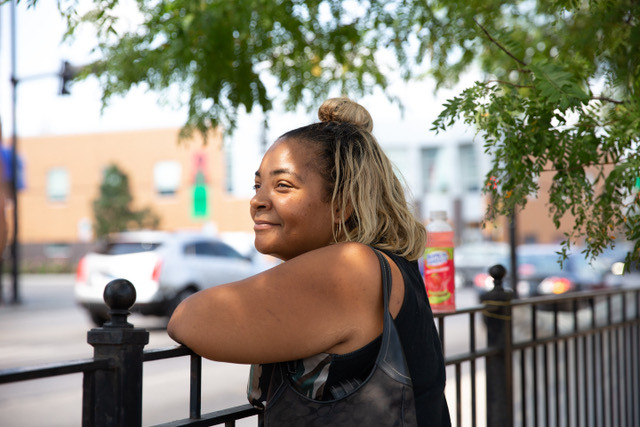“More than half of Rikers inmates are affected by mental illness and almost 17 percent have a serious mental health diagnosis. Yet throughout New York State, there are 30 mental health courts, which can only serve 140 participants under the current system.”

Courtesy of the filmmaker
A still from the documentary “Any Given Day” by Margaret Byrne, which explores the impact of incarceration on people dealing with mental health issues.“At the time, half the mental health clinics in Chicago closed. As a result, the jail population exploded.” —Margaret Byrne, filmmaker
Presented at ReelAbilities Film Festival: New York, the documentary “Any Given Day” tells the story of three individuals, Daniel, Angela, and Dimitar. Theyare three defendants living with mental illness going through a specialized probation program in mental health court, a model that has reduced recidivism and improved mental health outcomes. Fighting against the stigma of mental health and the urge to remain silent, the director also decides to tell her story and share her experiences with mental health, all intertwined with her family, her daughter, filmmaking, and everyday life.
“Any Given Day,” featuring Daniel, Angela, and Dimitar, offers a snapshot of the triumphs and the struggles of living with mental illness in big cities across America. They experience cycles of hospitalization and recovery while taking steps towards leading the lives they want. Daniel, Angela, and Dimitar are often seen walking throughout the city of Chicago, literally pushing forward in their journey towards recovery. Even when there are setbacks, with the care of family and friends, they forge ahead.
There are stark moments throughout the film where we are able to see the very real and grave consequences the criminal justice system has on people living with mental illness—from schizophrenia and bipolar disorder to depression. Daniel, Angela, and Dimitar faced criminal charges for actions taken when they were not fully themselves, like stealing a bottle of alcohol. These moments, when they were unwell, fully impacted their lives. Daniel successfully completes the probation program and moves into his own apartment which he loves and takes pride in, but he can’t work in the way that he wants for fear that he’ll lose his existing benefits. Angela had a hard childhood in the foster care system and has raised four children as a single parent. Despite her efforts to care for herself and her family, she needed to fight for custody and visitation with her youngest child. Dimitar was ready to move out of his mom’s place and find full time work, but due to his record, most employers would not give him a chance. All the while, Dimitar is a talented writer who publishes two books during the making of the film.
“Any Given Day” reminds us that people living with mental illness need treatment, not jail. Entering the criminal justice system impacted their employment, their housing, their families, and their mental health. Those on an upward swing after graduating from the mental health court probation program were up against tremendous barriers and like anyone might, fell into depression or relapsed.
It is without a doubt that we need more mental health courts in New York, where people living with mental illness can receive treatment while living in the community, such as counseling, case management, or harm reduction services.
More than half of Rikers inmates, for example, are affected by mental illness and almost 17 percent have a serious mental health diagnosis. Yet throughout New York State, there are 30 mental health courts, which can only serve 140 participants under the current system. And while there are 141 drug courts across New York, they exclude many applicants due to highly restrictive prerequisites.
Rather than receiving treatment, jailed New Yorkers—disproportionately people with serious mental illness—continue to be subjected to inhumane, unsafe conditions, including solitary confinement. And existing court treatment plans can require over a year of inpatient treatment, which creates a long wait time for those who need assistance and continues to isolate current participants from housing, employment, education, and family relationships in the community.
We are grateful that Daniel, Angela, and Dimitar have shared their stories. They have reminded us that mental health and drug courts can provide support, healthcare, and alternatives to the criminal justice system. For Daniel, Angela, and Dimitar, for our family, friends, and neighbors affected by mental illness, we must continue to advocate for treatment, not jail. We have no other option.
Filmmaker Margaret Byrne is the director of the documentary “Any Given Day” presented at the ReelAbilities Film Festival: New York. Alexa James is the chief executive officer of NAMI Chicago and Matt Kudish is the executive director of the National Alliance on Mental Illness of New York City (NAMI-NYC). Join our advocacy efforts.









One thought on “Opinion: Defendants Living with Mental Illness Need Treatment, Not Jail”
—-Opinion: “People Living with (a) Mental Illness” Need Treatment, Not Jail
The vast majority of us will never see the inside of a jail.
What specifically did you mean?
Harold A Maio